Article
Porshukov A.S. (2020). Personality traits of department heads in the internal affairs bodies . National Psychological Journal, [Natsional’nyy psikhologicheskiy zhurnal], (13)1, 107–114
Abstract
Background. In today’s science, the issue of changes in the internal affairs bodies management is one of the most crucial ones. In carrying out their duties the department heads must protect the rights and legitimate interests of citizens in accordance with the law. They are allowed to restrict the rights of citizens if it is required by their professional duties. That is why further development of a scientifically based approach to high department heads in the internal affairs bodies as a trigger for transformation processes should be recognized as absolutely relevant.
Objective. Identifying major personality traits required for high executive posts in the internal affairs body; identifying the most significant personality traits and management style of the department heads in the territorial internal affairs bodies; studying individual psychological determinants of career adaptability of internal affairs bodies department heads.
Design. The empirical research was carried out in the internal affairs agencies of the Krasnoyarsk Krai territorial unit and included three stages: 1. Conducting a survey among employees to identify the most significant personality traits required for high executive posts in the internal affairs body. The sample included 250 respondents with work experience from 3 to 25 years. 2. Conducting a survey aimed at determining the management style. The sample included 44 respondents. 3. Studying individual career adaptability of internal affairs bodies department heads. The following methods were used: “Adaptivity” (multi-factor personality test) method by A.G. Maklakov and S.V. Chermyanin was used to diagnose social adaptation; R. Cattel’s polyfactorial personal questionnaire; G. Eysenck Personality Inventory (EPI) questionnaire; A.Kokoshkarova Questionnaire for neuroticism and tendentious personal deviations (QNTPD); Bass-Darki aggression methods. To determine neuropsychic stability, the “Prognosis” method was used. The sample included 44 respondents.
Results. The level of career adaptability in department heads of the territorial internal affairs agencies of the Krasnoyarsk Krai Territory is directly related to neuropsychic stability, which is due to the presence of significant correlations with the “Prognosis” method (0.8267). There are significant correlations of career adaptability with indicators of neurasthenia (0.4398) and vegetative disorders (0.4121) according to Kokoshkarova method. According to the results of the mathematical-statistical analysis of the relationships of career adaptability with the Cattell method, significant correlations were identified: C (-0.3659) – increase in emotional stability with the development of career adaptability; L (0.2758) – confidence; H (-0,2617) – leader’s courage and psychological readiness for justified risk; M (0,1922) – adaptability to everyday service and practical views protects the manager from losing touch with reality; N (0.1198) – career adaptability develops, straightforward behavior substitutes avoiding excessive scheming or inappropriate flexibility.
Conclusion. The results can be used by practical psychologists when working with department heads of the territorial internal affairs agencies located in the republics of Hakassia, Tyva, Altay, Krasnoyarsk Krai, in the regions of Irkutsk, Kemerov, Tomsk. Further research to determine the impact of management conditions on transformations in the department heads ‘s personality is to be conducted.
Accepted: 02/16/2020
Pages: 107-114
DOI: 10.11621/npj.2020.0110
PDF: Download
Keywords: legal psychology; internal affairs bodies; personality traits; transformation processes; professional activity; leader;
Available Online 31.03.2020

Fig. 1. Respondents distribution

Fig. 2. Employees by work experience distribution

Fig. 3. Personality traits of the department heads in territorial police departments, Krasnoyarsk Krai Territory (Giselli,%)
Table 1. Management style of department heads
|
Management style |
Description |
N Respondents |
|
Determination |
The moral quality of the leader expressed in the consistent observance and upholding of certain principles, beliefs |
37 |
|
Competence, search for novelty |
Integral characteristics that reflect the level and nature of competence and how the person performs their activities at high level. It provides for the employee to ensure high work productivity, the effective implementation of professional activities in collaboration with other people, the presence of career-oriented qualities of the employee’s personality |
44 |
|
Career efficiency |
High ideology and consciousness, perseverance and strict discipline in work |
32 |
|
Organizational skills |
Are expressed in ordering, organization, achieving unity of work. The leaders do not only organize the activities of their subordinates, but also give them a certain focus, know how to justify the goal creating the right value orientation |
41 |
|
Critical thinking and critical assessment |
Determines the level of the leader’s self-esteem |
39 |
|
Being demanding and taking care of others |
Demanding for people, i.e. a high level of requirements for how subordinates behave and show themselves, to the quality of their behaviour. The demanding leaders expect themselves and the subordinates to be pro-active, responsible, cultured. |
35 |
|
Personal responsibility |
“I can” and “I must” fulfill my obligations, together with my internal duty to answer for the consequences of my actions |
32 |
|
Unity of word and deed |
High responsibility, discipline and culture |
37 |
|
Intolerance to bureaucracy, formalism, self-satisfaction |
Carrying out coercion, control and threats of punishment |
31 |
Table 2. Career adaptability correlated with personality traits of department heads (“Adaptivity” multi-factor personality test).
|
Personality Traits |
Career Adaptability |
|
Prognosis Test Results |
0.8267** |
|
Eysenck EPI Neurotism Scale |
0.4084** |
|
Kokoshkarova Neurasthenia Test |
0.4398** |
|
Kokoshkarova Autonomic DisturbancesTest |
0.4121** |
|
Cattel Factor С |
-0.3659* |
|
Bass-Darki Suspicion Test |
0.3097* |
** – statistic verification (р≤0,01)
* – statistic verification (р≤0,05)
For citing this article:
Porshukov A.S. (2020). Personality traits of department heads in the internal affairs bodies . National Psychological Journal, [Natsional’nyy psikhologicheskiy zhurnal], (13)1, 107–114


